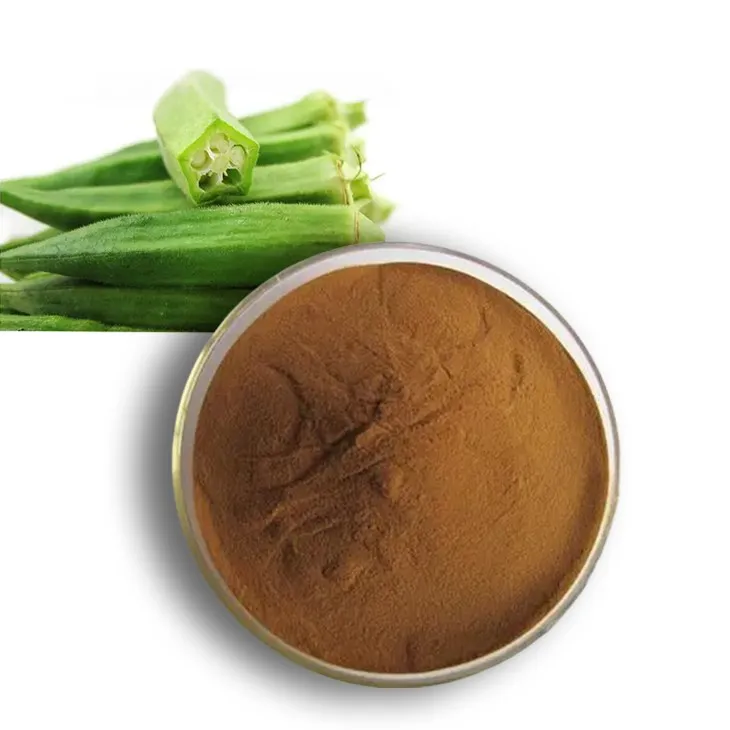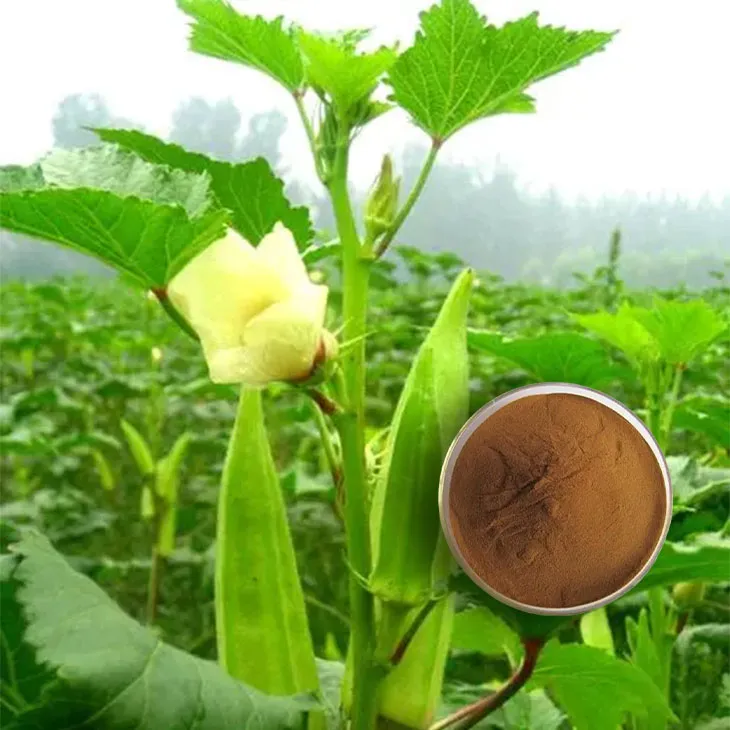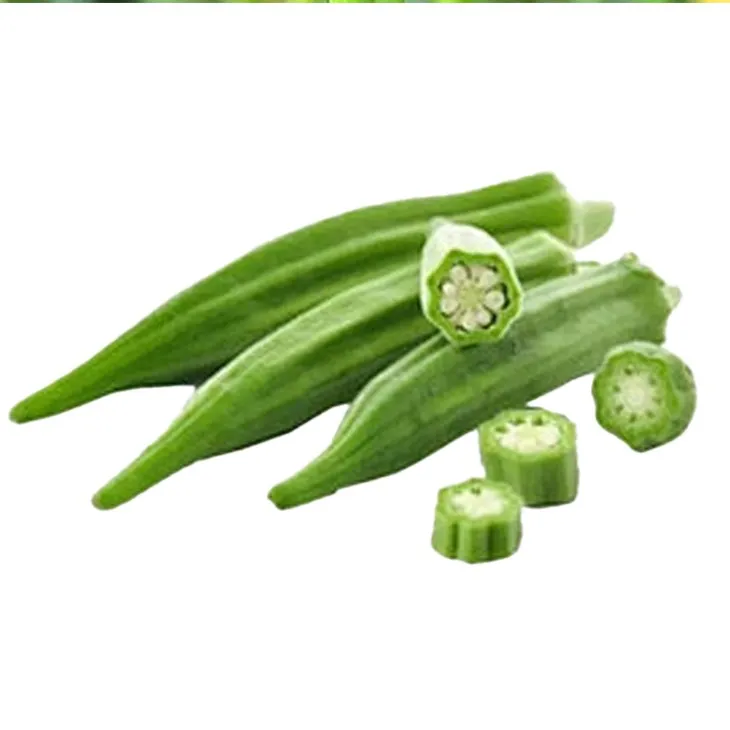- 0086-571-85302990
- sales@greenskybio.com
Components of okra extract in fertilizers and feeds.
2024-11-28

1. Introduction
Okra, a plant known for its edible pods, has been increasingly recognized for the potential of its extract in various applications, especially in fertilizers and feeds. The Okra Extract is a rich source of numerous bioactive compounds, nutrients, and other substances that can bring about significant benefits in both the plant and animal kingdoms.

2. Okra Extract in Fertilizers
2.1 Nutrient Composition
Okra Extract contains essential nutrients such as nitrogen, phosphorus, and potassium. Nitrogen is crucial for plant growth as it is a major component of amino acids, proteins, and nucleic acids. It helps in the greening of plants, promoting leafy growth. Phosphorus is involved in energy transfer processes within the plant, such as in photosynthesis and respiration. It also plays a vital role in root development, flowering, and fruiting. Potassium, on the other hand, is essential for maintaining the water balance in plants, enhancing disease resistance, and improving the quality of fruits and vegetables.
2.2 Bioactive Compounds
- Flavonoids: Okra extract contains flavonoids which have antioxidant properties. These antioxidants help plants to combat oxidative stress caused by environmental factors such as pollution, high temperature, and drought. By reducing oxidative stress, plants can grow better and have a higher survival rate.
- Mucilage: The mucilage present in okra extract can improve soil structure. It helps in retaining water in the soil, preventing soil erosion, and providing a favorable environment for soil microorganisms. These microorganisms play a crucial role in nutrient cycling, making nutrients more available to plants.
2.3 Growth - Promoting Effects
When okra extract is used in fertilizers, it can stimulate plant growth in multiple ways. For instance, it can enhance seed germination. The nutrients and bioactive compounds in the extract provide the necessary energy and signals for the seeds to sprout. It also promotes root elongation, allowing plants to access more water and nutrients from the soil. In addition, okra extract can increase the photosynthetic efficiency of plants. This means that plants can produce more food (glucose) through photosynthesis, which is then used for growth, development, and reproduction.

3. Okra Extract in Feeds
3.1 Nutritional Value
- Protein: Okra extract contains a certain amount of protein. Protein is an essential nutrient for animals as it is used for building muscle, repairing tissues, and producing enzymes and hormones. In animal feeds, the protein from okra extract can supplement the dietary protein requirements of animals.
- Vitamins: It also contains various vitamins such as vitamin C, vitamin E, and some B - vitamins. Vitamin C is important for the immune system of animals, helping them to resist diseases. Vitamin E is an antioxidant that protects cells from damage. B - vitamins play a role in metabolism, ensuring that animals can efficiently convert food into energy.
- Minerals: Okra extract is a source of minerals like calcium, magnesium, and iron. Calcium is necessary for strong bones and teeth in animals, as well as for proper muscle function. Magnesium is involved in many enzymatic reactions in the body, and iron is essential for oxygen transport in the blood.
3.2 Digestibility and Palatability
The mucilage in okra extract can improve the digestibility of feeds. It can form a gel - like substance in the digestive tract, which helps in the slow release of nutrients, allowing for better absorption. In terms of palatability, okra extract can add a unique flavor to the feed, making it more appealing to animals. This is especially important for picky eaters among animals, as it can increase their feed intake, which in turn promotes growth and development.
3.3 Health Benefits for Animals
- Immune System Boost: The vitamins and bioactive compounds in okra extract can enhance the immune system of animals. For example, the antioxidants can neutralize free radicals that can damage cells and weaken the immune system. A strong immune system helps animals to better resist infections and diseases.
- Digestive Health: As mentioned earlier, the mucilage can improve digestive health. It can prevent digestive disorders such as diarrhea and constipation by maintaining the proper consistency of the feces. It also promotes the growth of beneficial gut bacteria, which are important for overall health.

4. Applications of Okra Extract in Fertilizers
4.1 Organic Farming
Okra extract is highly suitable for organic farming. In organic farming, the use of synthetic fertilizers is restricted, and natural alternatives are preferred. Okra extract provides a natural source of nutrients and bioactive compounds, making it an excellent choice for organic farmers. It can be used to fertilize a wide variety of crops, including vegetables, fruits, and grains. For example, in tomato farming, applying okra extract - based fertilizer can result in healthier plants with more abundant yields.
4.2 Hydroponics
Hydroponics is a method of growing plants without soil, where the plants are supplied with nutrient - rich water. Okra extract can be incorporated into the nutrient solution used in hydroponics. The bioactive compounds in the extract can have a positive impact on plant growth in a hydroponic environment. For instance, the flavonoids can help protect the plants from diseases that are more likely to occur in hydroponic systems due to the high humidity and close plant spacing.
4.3 Lawn and Turf Care
Okra extract can also be used in lawn and turf care. The nutrients and growth - promoting factors in the extract can help in maintaining a lush and green lawn. It can enhance the root system of grass, making it more resistant to drought and foot traffic. Applying okra extract - based fertilizer to lawns can also reduce the need for chemical fertilizers, which are often harmful to the environment.
5. Applications of Okra Extract in Feeds
5.1 Livestock Feeding
- Cattle: Okra extract can be added to cattle feed. The protein and other nutrients in the extract can supplement the diet of cattle, especially during periods of rapid growth or when forage quality is low. It can also improve the digestibility of the feed, reducing feed costs as less feed is wasted.
- Pigs: In pig farming, okra extract can be beneficial. It can enhance the immune system of pigs, reducing the incidence of diseases. The improved palatability of the feed with okra extract can also increase the feed intake of pigs, leading to faster growth and better meat quality.
- Sheep: For sheep, okra extract can provide additional nutrients, especially in winter when grazing is limited. The vitamins and minerals in the extract can help maintain the health of sheep, preventing deficiencies that can lead to various health problems.
5.2 Poultry Feeding
- Chickens: Okra extract can be included in chicken feed. The vitamins and minerals in the extract can improve the egg quality of hens. The antioxidant properties of the extract can also protect the cells of chickens from oxidative damage, enhancing their overall health. In broiler chickens, okra extract can promote growth and improve meat quality.
- Ducks: In duck farming, okra extract can have similar benefits. It can improve the digestibility of the feed, increase the feed intake, and contribute to better growth and development. The nutrients in the extract can also enhance the immune system of ducks, making them more resistant to diseases.
5.3 Aquaculture
Okra extract can also be used in aquaculture. In fish and shrimp farming, the nutrients in the extract can be utilized by aquatic animals. The protein in okra extract can be a source of dietary protein for fish and shrimp. The bioactive compounds can enhance the immune system of these aquatic animals, reducing the susceptibility to diseases. Moreover, the improved digestibility of the feed with okra extract can lead to better growth and survival rates in aquaculture.
6. Challenges and Future Prospects
6.1 Challenges
- Extraction Process: One of the main challenges is optimizing the extraction process of okra extract. The extraction method needs to be efficient in terms of yield and cost - effectiveness while maintaining the integrity of the bioactive compounds. Currently, some extraction methods may be complex or expensive, limiting the large - scale production of okra extract for fertilizers and feeds.
- Standardization: There is a lack of standardization in the composition and quality of okra extract products. Different extraction methods and sources of okra can result in variations in the nutrient and bioactive compound content. This makes it difficult for farmers and feed producers to ensure consistent results when using okra extract in their products.
- Awareness and Acceptance: Many farmers and feed producers are still not fully aware of the benefits of okra extract. There is a need for more research and education to promote the use of okra extract in fertilizers and feeds. Without sufficient awareness and acceptance, the potential of okra extract in these areas may not be fully realized.
6.2 Future Prospects
Despite the challenges, the future prospects of okra extract in fertilizers and feeds are promising. With further research, more efficient extraction methods can be developed. This will lead to a reduction in cost and an increase in the availability of okra extract. Standardization efforts can also be made to ensure the quality and consistency of okra extract products. In addition, as the demand for organic and sustainable farming and animal production increases, okra extract, being a natural and environmentally friendly ingredient, is likely to gain more popularity. It has the potential to become a mainstream ingredient in fertilizers and feeds, contributing to more sustainable and efficient agricultural and aquacultural practices.
FAQ:
What are the main components of okra extract in fertilizers?
Okra extract in fertilizers may contain various components. It often has vitamins, such as vitamin C and some B - vitamins, which can play a role in plant metabolism. Minerals like potassium are also likely to be present. Potassium is important for plant growth as it helps in functions like water regulation and photosynthesis. Additionally, there may be certain amino acids and plant hormones or their precursors. Amino acids can contribute to protein synthesis in plants, and plant hormones can regulate growth processes like cell division and elongation.
What are the benefits of okra extract components in feeds for animals?
The components of okra extract in feeds can offer several benefits to animals. For example, it may contain dietary fiber which can help with digestion in animals, especially for those with a more complex digestive system like ruminants. Some bioactive compounds present might have antioxidant properties, which can help protect the animal's cells from oxidative damage. Also, if there are certain essential amino acids in the okra extract, it can contribute to the animal's protein synthesis and overall growth. Nutrients like vitamins and minerals in the extract can also fill in potential nutritional gaps in the regular feed, ensuring better health and productivity of the animals.
How does the okra extract in fertilizers affect plant growth?
The okra extract in fertilizers affects plant growth in multiple ways. As mentioned before, the presence of potassium in it helps in water regulation within the plant. This means that the plant can better withstand drought or excessive watering conditions. The vitamins and amino acids can stimulate the plant's natural growth processes. Vitamins can be involved in enzymatic reactions that are crucial for metabolism, and amino acids are building blocks for proteins that are necessary for plant structure and function. Plant hormones or their precursors in the okra extract can regulate growth patterns, for example, promoting root growth which in turn helps the plant to better absorb nutrients from the soil.
Are there any potential drawbacks of using okra extract in fertilizers and feeds?
While okra extract has many benefits, there can be some potential drawbacks. In fertilizers, if not properly formulated, the okra extract may introduce an imbalance in nutrient ratios. For example, if it has a high concentration of a particular mineral and is over - used, it could lead to toxicity in plants. In feeds, some animals may have sensitivities or allergies to certain components in the okra extract. Also, the cost of incorporating okra extract into fertilizers and feeds needs to be considered. If it is too expensive, it may not be a practical option for large - scale agricultural or livestock operations.
How can the quality of okra extract in fertilizers and feeds be ensured?
To ensure the quality of okra extract in fertilizers and feeds, strict quality control measures are necessary. In the production process, proper extraction methods should be used to preserve the bioactive components. This may involve using appropriate solvents and extraction techniques at the right temperature and pressure. Testing for contaminants such as heavy metals and pesticides is crucial. For fertilizers, ensuring the correct nutrient composition and concentration in the okra extract is essential. In feeds, compliance with animal feed safety regulations regarding ingredient quality and safety is necessary. Regular quality checks during production, storage, and distribution can help maintain the quality of okra extract in both fertilizers and feeds.
Related literature
- The Role of Okra Extract in Sustainable Agriculture: A Comprehensive Review"
- "Bioactive Compounds in Okra Extract: Implications for Animal Nutrition"
- "Okra Extract - based Fertilizers: Composition and Their Impact on Crop Yield"
- ▶ Hesperidin
- ▶ citrus bioflavonoids
- ▶ plant extract
- ▶ lycopene
- ▶ Diosmin
- ▶ Grape seed extract
- ▶ Sea buckthorn Juice Powder
- ▶ Beetroot powder
- ▶ Hops Extract
- ▶ Artichoke Extract
- ▶ Reishi mushroom extract
- ▶ Astaxanthin
- ▶ Green Tea Extract
- ▶ Curcumin Extract
- ▶ Horse Chestnut Extract
- ▶ Other Problems
- ▶ Boswellia Serrata Extract
- ▶ Resveratrol Extract
- ▶ Marigold Extract
- ▶ Grape Leaf Extract
- ▶ blog3
- ▶ blog4
-
Certified organic coenzyme Q10.
2024-11-28
-
Australian Organic Propolis Extract Powder.
2024-11-28
-
The extraction process of vitamin B6.
2024-11-28
-
How to make powder with selenium yeast?
2024-11-28
-
Chinese β - Carotene Suppliers
2024-11-28
-
Bayberry Extract
2024-11-28
-
Tongkat Ali Extract Powder
2024-11-28
-
Grape Leaf Extract
2024-11-28
-
Citrus bioflavonoids
2024-11-28
-
Tinospora cordifolia extract
2024-11-28
-
Cat Claw Extract
2024-11-28
-
Artichoke Leaf Extract
2024-11-28
-
Pomegranate Extract
2024-11-28
-
Artichoke Extract
2024-11-28
-
Tamarind extract powder
2024-11-28





















